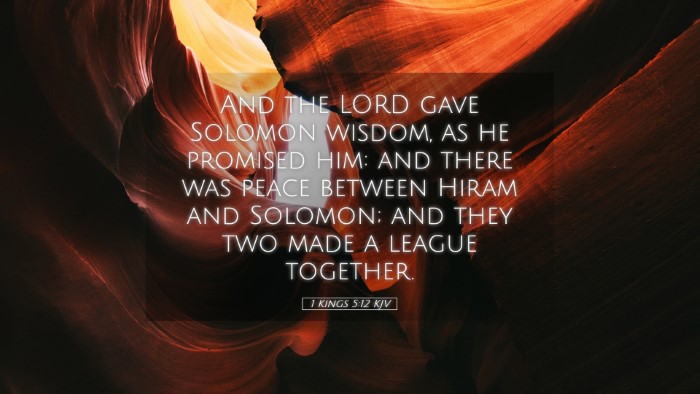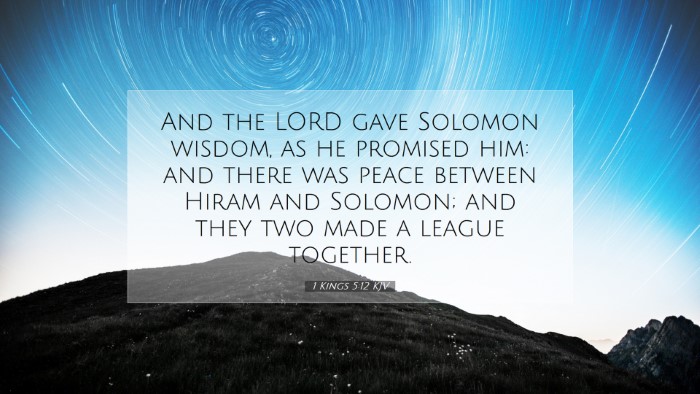Old Testament
Genesis Exodus Leviticus Numbers Deuteronomy Joshua Judges Ruth 1 Samuel 2 Samuel 1 Kings 2 Kings 1 Chronicles 2 Chronicles Ezra Nehemiah Esther Job Psalms Proverbs Ecclesiastes Song of Solomon Isaiah Jeremiah Lamentations Ezekiel Daniel Hosea Joel Amos Obadiah Jonah Micah Nahum Habakkuk Zephaniah Haggai Zechariah Malachi1 Kings 5:12
1 Kings 5:12 KJV
And the LORD gave Solomon wisdom, as he promised him: and there was peace between Hiram and Solomon; and they two made a league together.
1 Kings 5:12 Bible Commentary
Commentary on 1 Kings 5:12
Verse Text: "And the Lord gave Solomon wisdom, as he promised him: and there was peace between Hiram and Solomon; and they two made a league together." (1 Kings 5:12)
Introduction
This verse serves as a pivotal moment in the relationship between Solomon, the king of Israel, and Hiram, the king of Tyre. The implications of this alliance and the wisdom granted to Solomon are profound, impacting the future of Israel and the construction of the Temple. Commentaries from respected theologians provide rich insights into the themes of divine wisdom, diplomatic relations, and the fulfillment of God's promises.
Divine Wisdom Given to Solomon
Matthew Henry remarks on the significance of the wisdom bestowed upon Solomon. He notes that this wisdom is not merely intellectual but includes practical applications that enable Solomon to govern effectively. Henry emphasizes that wisdom is a gift from God and is essential for any leader. In this instance, the wisdom given to Solomon facilitates a peaceful relationship with Hiram, allowing for collaboration in the monumental task of building the Temple.
Albert Barnes expands on this idea by highlighting that God's promise of wisdom to Solomon was fulfilled in a manner that showcased Solomon's capability to lead and negotiate. Solomon's wisdom extended beyond mere decisions; it was characterized by an understanding of human nature and the art of diplomacy. Barnes notes that this wisdom not only benefitted Solomon but also promoted peace and prosperity between the two kingdoms, which is crucial for Israel's stability.
Hiram and Solomon's Alliance
The alliance between Hiram and Solomon is a significant aspect of this verse. Adam Clarke discusses how Hiram, a skilled craftsman, played a vital role in the construction of the Temple. The partnership symbolizes a successful collaboration between Israel and Tyre, which had ramifications for trade, culture, and mutual benefit. Clarke elucidates that the league formed due to shared interests—both rulers aimed to achieve greatness through the construction of the House of the Lord.
Moreover, Matthew Henry observes that this relationship exemplifies how God can use human partnerships to accomplish divine purposes. The peace established between Hiram and Solomon is a testament to the efficacy of wisdom in fostering unity and collaboration. The joint effort in building the Temple is not just a physical construction project but also a theological statement about God's presence among His people.
Theological Implications
This verse is rich in theological implications. Albert Barnes points out that the mention of peace symbolizes a broader spiritual peace that Israel experienced during Solomon's reign. The wisdom of Solomon can be seen as a manifestation of God's grace; it indicates that when leaders seek divine guidance, peace and prosperity often follow. This principle is applicable to contemporary leaders who aspire to govern wisely and justly.
Matthew Henry reinforces this by explaining that peace is essential for the flourishing of any society. He relates this to the broader Biblical narrative, where God repeatedly promises peace to His people. Solomon's wise leadership creates an environment where the people could worship God freely, thereby fulfilling God’s ultimate plan for Israel as a nation set apart for Him.
Applications for Today's Church
This passage invites reflection on the nature of God-given wisdom and the importance of alliances in pursuing God’s work. Adam Clarke suggests that modern churches should pursue wisdom and seek collaborative relationships with others in the community to build the Kingdom of God. The church can learn from Solomon’s example by fostering diplomacy and cooperation, especially in ecumenical efforts to address societal issues.
Furthermore, Matthew Henry underscores the need for leaders within the Church to continuously seek divine wisdom in their decision-making processes. The legacy of Solomon serves as a reminder that leadership grounded in wisdom leads to peace and a greater capacity to fulfill God’s calling for the church.
Conclusion
1 Kings 5:12 encapsulates critical themes of divine wisdom, peace, and the importance of strategic alliances. Reflecting on this verse through the lens of public domain commentaries enriches our understanding of leadership as a theological vocation. The insights gleaned from the wisdom of Solomon and his diplomatic relationship with Hiram continue to resonate with contemporary readers, inspiring us to seek God's guidance in our endeavors, cultivate peace in our communities, and strive for collaborative efforts in building His Kingdom.


